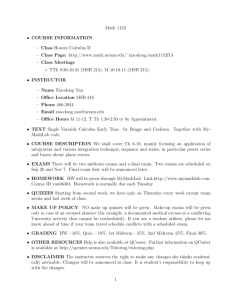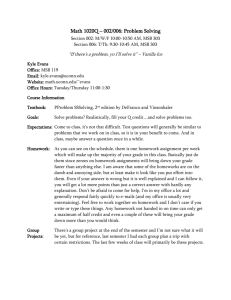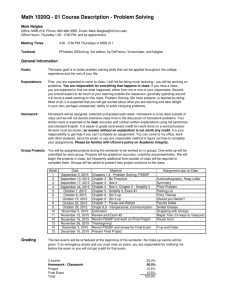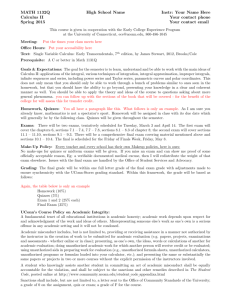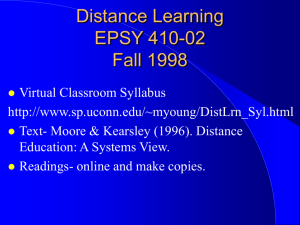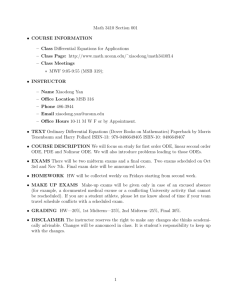Math 1030Q – Elementary Discrete Mathematics
advertisement
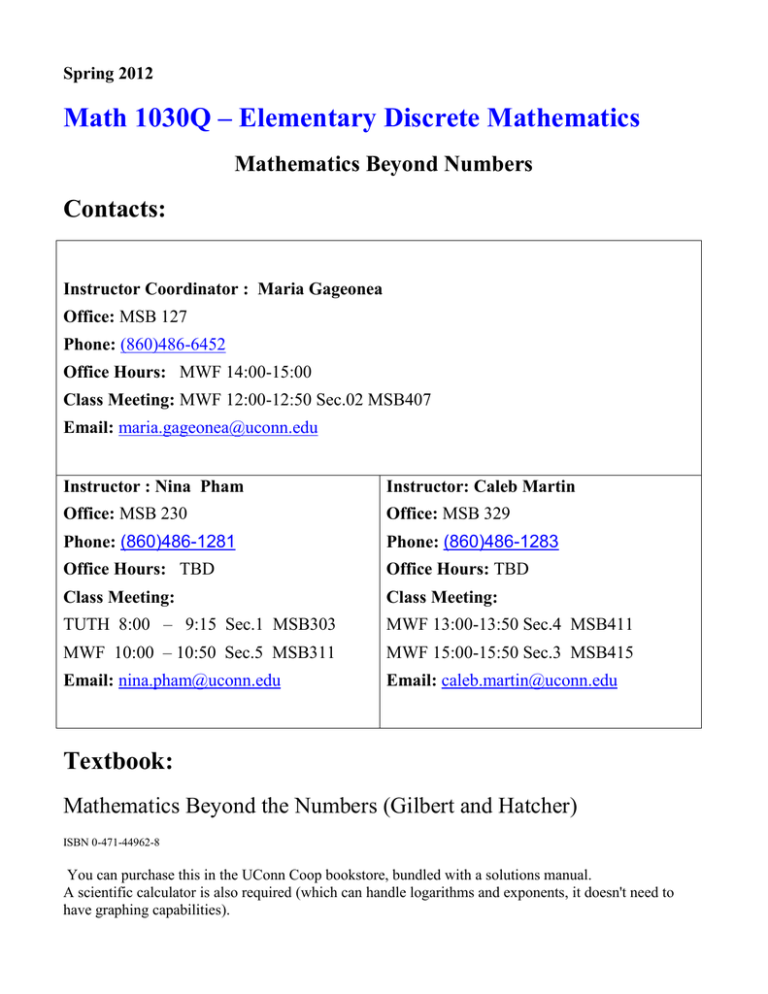
Spring 2012 Math 1030Q – Elementary Discrete Mathematics Mathematics Beyond Numbers Contacts: Instructor Coordinator : Maria Gageonea Office: MSB 127 Phone: (860)486-6452 Office Hours: MWF 14:00-15:00 Class Meeting: MWF 12:00-12:50 Sec.02 MSB407 Email: maria.gageonea@uconn.edu Instructor : Nina Pham Instructor: Caleb Martin Office: MSB 230 Office: MSB 329 Phone: (860)486-1281 Phone: (860)486-1283 Office Hours: TBD Office Hours: TBD Class Meeting: Class Meeting: TUTH 8:00 – 9:15 Sec.1 MSB303 MWF 13:00-13:50 Sec.4 MSB411 MWF 10:00 – 10:50 Sec.5 MSB311 MWF 15:00-15:50 Sec.3 MSB415 Email: nina.pham@uconn.edu Email: caleb.martin@uconn.edu Textbook: Mathematics Beyond the Numbers (Gilbert and Hatcher) ISBN 0-471-44962-8 You can purchase this in the UConn Coop bookstore, bundled with a solutions manual. A scientific calculator is also required (which can handle logarithms and exponents, it doesn't need to have graphing capabilities). Course Outline Week Sections Topics Homework 1 1.1 1.2 Plurality, Runoff methods Borda's Method pg 15 # 1, 3, 6, 7, 11, 15 pg 28 # 1, 3, 5, 9, 12 2 1.3 1.4 Head-to-head Comparisons Approval Voting pg 39 # 1, 3, 7, 9, 11, 15 pg 51 # 2, 5, 7, 9, 11, 15 3 2.1 2.2 Quota methods Early Divisor Methods pg 80 # 1, 3, 5, 8, 9 pg 99 # 1, 3, 5, 7, 11, 13 3.1 Review Exam 1 Algebra Review pg 133 # 1-29 odd 4 5 3.2 3.3 Simple Interest Compound Interest pg 138 # 1, 7, 11, 15, 17, 21, 23, 27, 30 pg 150 # 1, 5, 9, 13, 17,21, 31, 35, 39, 52 6 3.4 3.5 Systematic Savings Amortized Loans pg 161 # 1, 5, 9, 13, 15, 19, 21 pg 174 #1,5.9,13,17,23 4.1 Elementary Probability pg 192 # 1, 3, 5, 9, 11, 13, 17, 19, 23,29 pg 205 # 1, 3, 5, 7, 11, 13, 15 4.3 The Addition Rule Review 7 8 Exam 2 4.4 pg 215 # 1, 3, 7, 11, 13, 19, 23, 27, 34 4.5 Conditional Probability, BayesTheorem Counting Techniques 10 4.6 4.7 More Probability Expected Value pg 242 # 1, 5, 9, 13, 17, 21, 25, 28,31,33 pg 248 # 1, 5, 9, 12, 13 17,23 11 4.8 Genetics Review pg 260 # 1,3- 6, 7, 11-13, 17, 21, 25 9 12 13 14 pg 232 # 1, 5, 9, 13, 17, 21, 25, 29, 35 6.1 Exam 3 Euler Paths and Circuits pg 375 # 1, 5, 7, 11, 13, 15, 17,23,28, 31 6.2 6.3 Traveling Salesman Spanning Trees pg 396 # 1, 5, 7, 9, 15, 19, 21,23 pg 411 # 1, 3, 5, 7, 11, 15, 21 Review Course Objectives: This course will stress problem solving skills and the development of reasoning skills in an interactive setting. The mathematics involved are not difficult, but are probably different than the work to which you are accustomed. We will see how some of these mathematical ideas have very real and useful applications to the world around us. Homework: The material covered in this course takes practice! The course outline at the end of this syllabus contains reading assignments and practice problems for each section. Homework problems will not be collected, but you will do yourself a disservice by neglecting them. Working through examples is the best way to learn these concepts. Exams: There will be 3 in-class hour-long exams and one cumulative final exam. They will be administered on: Exam 1: Monday, February 6 Exam 2: Wednesday, March 7 Exam 3: Wednesday, April 11 Final Exam: TBD (Final Exams Week) Attendance at all exams including the final exam are mandatory, and no make-up examinations will be offered. Exact time and date of final exam is TBD by registrar office http://registrar.uconn.edu/exams_preliminary_spring.htm The pace of the course will be adjusted somewhat, depending on the pace of the classroom discussions, so the student must always be up to date on what the assignments are. Final Grades will be calculated as follows: Best 2 In-Class Exams - 20% Each Other In-Class Exam - 10% Quizzes & Projects - 20% Cumulative Final - 30% Quizzes & Projects: Short quizzes will be given usually at the end of class each Friday and will be based on the recommended homework assignments. There will be no make-ups for missed quizzes. Small projects may be assigned throughout the semester to reinforce understanding of the topics. Class guidelines: It is expected that everyone in our class will act in a respectful manner Turn off all cell phones and beepers before the start of class. Laptops are not to be used in class As much of the class time will be devoted to active participation in discovering solutions to problems, regular attendance and class participation is expected Stay up-to-date with the readings. If you are late to class, please enter quietly and take your seat quickly Cheating of any kind is absolutely unacceptable and will be result in failure of the assignment. Please review the student code: http://www.dosa.uconn.edu/student_code.html The Q Center: In addition to your instructor's office hours, you can get help with the material in your course at the UConn Q Center. The UConn Q Center provides tutoring for a list of Q courses from a number of departments. In addition to free, drop-in tutoring, the Q Center maintains a list of private tutors. For information on hours and locations please check the Q Center website: www.qcenter.uconn.edu
